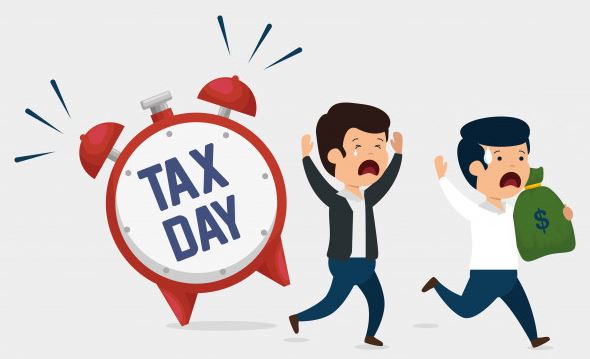Digital service tax Kenya: “With the fast advancement of technology, many business transactions are increasingly being carried out through digital platforms,” said Treasury Cabinet Secretary Ukur Yatani during the 2020/2021 Budget Statement.
“It’s, therefore, necessary to provide a framework that will facilitate taxation of such income,” the CS added.
Do you know what framework Mr Yatani was talking about? It’s the digital service tax (DST) that came into effect on January 1st, 2021.
For a long time, online transactions have been generating billions of Kenya shillings, but the government hasn’t been getting any. The taxman understands that, and that’s why they are so objective with the DST arrangement.
The Kenyan Treasury believes that DST can help the Kenya Revenue Authority (KRA) generate more than Ksh 45 million in revenue before the end of June 2021.
While that is yet to be realized, the DST framework is in full effect, and anyone dealing with digital services needs to get familiar with the basics.
Kenya now joins South Africa, India, Uganda and Tanzania in taxing digital services.
But, what is digital service tax, exactly? Who does it affect? What services are chargeable, and what is the rate?
You, like many other digital service providers in Kenya, probably have these questions and many others.
Some people even think that everything in the online marketplace will be charged. Others are worried that they’ll pay more for digital goods.
Well, I understand that there’s more that’s unclear about digital service tax Kenya. That’s why I’ll take you through the DST basics to help you understand your obligations.
Now let’s get into it:
What Is Digital Service Tax?
KRA defines digital service tax as tax payable on income earned on a digital marketplace in Kenya.
When speaking of a digital marketplace, KRA describes it as an online platform that allows buyers and sellers’ direct interaction. That includes online stores like Jumia, Masoko, Amazon, and Kilimall.
What Is The Proposed DST Rate?
Currently, the proposed DST rate in Kenya is 1.5% of the Gross Transaction Value of a transaction done on a digital marketplace.
So, What Is Gross Transaction Value?
The Gross Transaction Value (GTV) is the total cash amount received on an online marketplace over a particular period.
The simplest way to calculate the GTV is to multiply the unit cost of an item by the total number of pieces sold.
For example, if you sell a t-shirt for Ksh 1,000 and manage to sell 100 copies in a month, then the Gross Transaction Value will be Ksh 100,000.
Now, multiply the Ksh 100,000 GTV by 1.5%, and your Digital Service Tax liability will be Ksh 1,500.
Remember, the Gross Transaction Value is sometimes known as the Gross Merchandise Value (Shortened as GMV). It’s also worth noting that GTV is exclusive of the government’s VAT.
How Is It Taxed? What Are The Chargeable Services?
Digital service tax Kenya applies to a variety of digital services that include:
- Downloadable digital content like eBooks, mobile apps, games, and movies
- Streaming services like TV shows, movies, and podcasts
- Online subscriptions like news, journals, and e-magazines
- Online training, what we call e-learning, and pre-recorded online courses
- Electronic tickets and bookings
- Digital-generated licenses
- Digital data management solutions like cloud storage services, web hosting, and data warehousing
- Search engine services and automated help desk solutions
- Direct sales on one’s website and social media platforms like Facebook and WhatsApp
- Netflix, Amazon Prime, and other subscriptions alike
- Any other service I haven’t mentioned conducted on a digital marketplace
Who Pays DST?
According to KRA, DST payments are the responsibility of a digital service provider or anyone who collects payments on their behalf.
So, for a non-resident, with no permanent establishment in Kenya, they can appoint a tax accountant to file for their DST.
How Does One Determine The Taxpayer’s Location?
Several parameters are used to determine if users are in Kenya and liable for DST in Kenya.
The first parameter is the Payment Proxy, which determines if the payments were made through a Kenyan-based company or financial institution.
The other parameter is Internet Proxy, which is all about determining if the services were offered using a Kenyan-registered IP address or a Kenyan-assigned international phone country code.
Another popular parameter is Terminal Proxy that determines if the user accessed the digital service using a computer, smartphone, or tablet in Kenya.
Lastly, the Location Proxy determines if the user has a Kenyan residential, business, or billing address.
Who Does Digital Service Tax Target?
Generally, DST targets Kenyan residents and non-residents who earn or make money in Kenya by offering digital services.
Non-residents who offer digital services in Kenya but do not have a permanent residence in Kenya need to visit itax.kra.go.ke to comply with the requirements.
Alternatively, they can appoint a tax professional to handle the filing.
As for Kenyan residents, DST applies as an advance tax offset against annual taxable income.
As a resident who offers digital services, you don’t have to sign up for DST. That’s because you can access your iTax profile to file for your DST online.
How About Non-Residential Companies Offering Digital Services In Kenya?
A non-resident company that offers digital services in Kenya is only liable to DST if:
- Users receive digital solutions from a Kenyan-based terminal. The terminal could be a handheld device like a smartphone or tablet or even a computer.
- Payments are through credit card or debit card services offered by a Kenyan company.
- The business owner has a Kenyan residential, billing, or business address.
- The digital services are procured through a Kenyan-registered IP address or Kenyan-assigned international phone call country code.
What Income Is Exempted From DST?
As you might have guessed, not all income earned online is subject to DST. That includes the following:
- Income already subjected to withholding tax
- Income by a non-resident who is running a business that transmits messages either by radio, TV, cable, optical fiber, or satellite
- Online payment service provider, lender, or Forex trader who transact through a service provider approved by CBK (Central Bank of Kenya) or government institution
When Should You File? Any Penalties?
You are required to file your DST before the 20th, immediately after the month that the transaction was conducted.
Failure to submit your DST returns by the due date will result in a penalty that equals 5% of your tax due. And if you fail to pay the DST by the due date, then you’ll also be liable to a penalty that equals 5% of your unpaid tax.
Additionally, you’ll be liable to pay 1% interest every month after the due date.
Is Digital Service Tax Good For the Kenyan Economy?
Every patriotic Kenyan will love to know if a new tax measure is good for the economy. According to the taxman, digital service tax will ensure fairness between the old ways of doing business and modern techniques.
But apart from leveling the business field, DST will improve the government collection without necessarily overburdening taxpayers, who already have a hefty tax obligation.
And given that digital service tax Kenya also targets foreign companies that dominate the Kenyan digital marketplace. The implementation will see these companies redirect a part of the income they earned into the country.
In the long run, that will boost the growth of the Kenyan economy.
How Do I Sign Up For DST?
You can sign up for DST online through the iTax platform. So, you’ll need to visit itax.kra.go.ke/KRA-Portal.
If you are a non-resident without a permanent Kenyan establishment, you can sign up with a tax representative’s help.
Here’s the information you’ll need to provide during the registration:
- Name of the business
- Name of the appointed contact person
- Phone number, postal address, registered address, and email of the contact person
- Website locater of the DST applicant
- Certificate of Incorporation
- Tax identification number
In Conclusion
I’ve shared the basics about digital service tax Kenya. Hopefully, you learned what’s essential, and you now know what your obligations are.
Related: How To File Kra Returns
